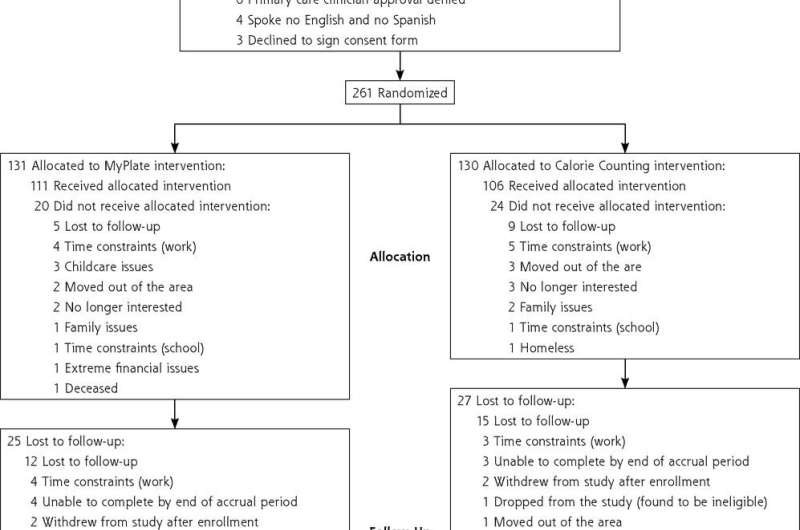This article has been reviewed according to Science X's editorial process and policies. Editors have highlighted the following attributes while ensuring the content's credibility:
fact-checked
peer-reviewed publication
trusted source
proofread
Focusing on satiety and satiation may aid long-term weight loss compared to calorie counting diets

Researchers hypothesized that focusing on satiety (feeling free of hunger) and satiation (feeling satisfied with a meal) through the consumption of fruits and vegetables may be better targets for weight loss success. The researchers compared the impact of two diets—Diabetes Prevention Program Calorie Counting versus MyPlate—on satiation (feeling satisfied with a meal), satiety (feeling free of hunger) and on body fat composition in primary care patients.
Two hundred and sixty-one overweight, adult, low-income Latina patients, participated in the randomized control trial over a 12 month period. Over the course of the study, community health workers conducted two home education visits; two group education sessions; and seven telephone coaching calls for each participant over a six-month period. The researchers measured satiation and satiety, as well as waist circumference and body weight among participants.
These measures were assessed at the beginning of the trial and again at six- and 12-month follow-up visits.
The researchers found satiation and satiety scores increased for participants on both diets. Both MyPlate and Calorie Counting participants reported higher quality of life and emotional well-being, as well as decreased waist circumference and high satisfaction with their assigned weight loss program.
MyPlate participants experienced lower systolic blood pressure at a six month follow-up visit although this was not sustained over the 12-month trial period. Results suggest that the MyPlate-based intervention may be a practical alternative to the more traditional calorie counting approach.
What we know:
Approximately 42% of Americans are considered obese, according to the National Center for Health Statistics. Traditional methods of addressing obesity have been to restrict calories while reducing food intake. This has short-term efficacy.
What this study adds:
Comparing the MyPlate and Calorie Counting interventions among an adult, low-income, mostly Latina population, researchers found that both programs increased levels of satiation and satiety among participants, as well as promoting better quality of life, emotional well-being, and program satisfaction.
The simpler MyPlate diet led to weight loss and lower systolic blood pressure in the short-term although not long-term. The team recommended more research to investigate satiety-enhancing approaches for desirable weight control in diverse populations and the use of community health workers as change agents.
The findings are published in The Annals of Family Medicine journal.
More information: William J. McCarthy et al, Randomized Comparative Effectiveness Trial of 2 Federally Recommended Strategies to Reduce Excess Body Fat in Overweight, Low-Income Patients: MyPlate.gov vs Calorie Counting, The Annals of Family Medicine (2023). DOI: 10.1370/afm.2964





















